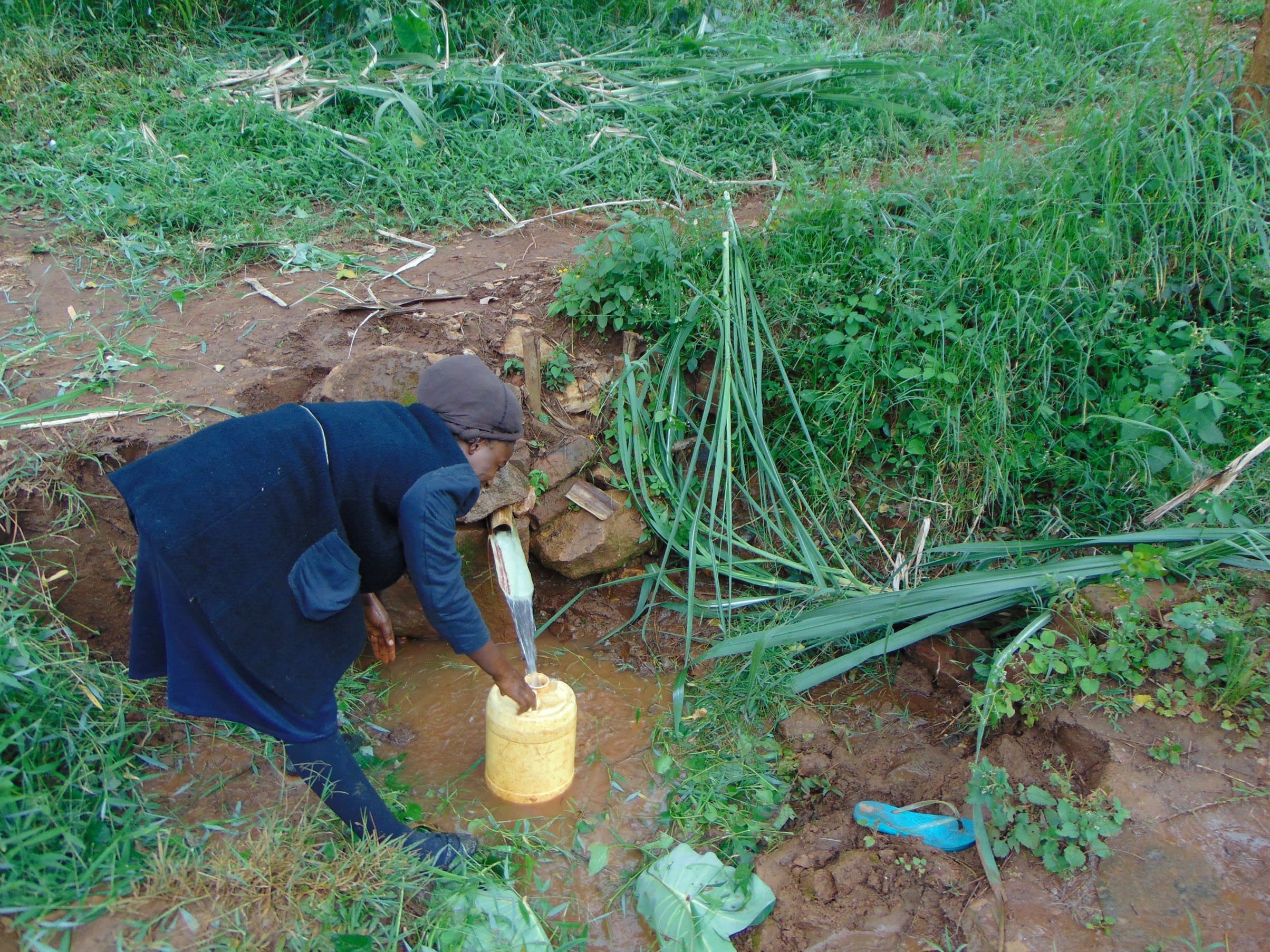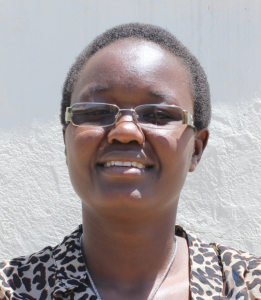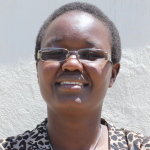The day we visited Namarambi Village, it was cold and rainy and this made getting down to Iddi Spring very slippery and muddy. Iddi Spring has a lot of water, but it is open to contamination because there is no cut off drainage above the spring to redirect dirty runoff. It is a water source that community members here have depended on for years. Even during one of the driest seasons on record this last year, Iddi Spring served more than fifty households and it never dried.
To access water from the spring, community members have improvised a spout using a banana stem to direct the water directly into their containers. Most households store water in a traditional clay pot but believe that when water is inside the pot, it is treated naturally by the clay and has no further need for treatment.
Even with Iddi Spring's reliability, however, there are times when its yield decreases due to several eyes that feed the spring, which is currently not directed into the same discharge pipe. When this happens, water scarcity contributes to lower crop yields and the death of livestock, which can quickly lead to food shortages. It also leads to conflict among the community members because when queuing to access clean water, some people will fight to get water by force, leaving others who can not fight to either wait for a long time or go without water entirely.
Because Iddi Spring is the main source of water for Namrambi, some 200 community members are forced to consume contaminated water, thus leading to different types of diseases like typhoid, cholera, dysentery, and Bilharzia. The two leading causes of death in Namarambi Community are Typhoid, which is caused by consuming contaminated water, and Malaria, carried by mosquitos which can easily breed in the standing water around the spring.
"Water is everything that every human being must have access to," said Shaban Musa, a local farmer.
"When we lack clean water, we stagnate because instead of developing ourselves we are busy going to the hospital because one of us has typhoid or diarrhea. We really need our spring to be protected so that we reduce the money that we use to visit the hospital every time to do other things that will benefit our families. I am so happy that you have finally come to our rescue because we will be able to access clean and safe water for consumption and our lives will not be the same again."

The surrounding area is well vegetated because the community members practice farming. They plant maize, sugarcane, vegetables, bananas, and some, including Shaban, keep bees for honey. It is a rural area so it is peaceful. The community members still live in traditional houses where some are grass-thatched houses with mud walls and others are roofed with iron sheets and are also mud-walled.
Families in Namarambi live together, both extended and nuclear families in the same compound but different households. Men are considered to be the head of their families and they are supposed to provide for them because they earn money, while women are supposed to take care of the children.
Namarambi Village is unique because both Muslims and Christians live together as one family and they do farming and business activities together. People of both faiths have intermarried and they gather together for weddings and birth ceremonies without having any boundaries about some people coming from different religions.
The most common source of livelihood in this community is selling farm produce. People plant sugarcane which they take and sell to Butali Sugar Company, but because sugarcane takes some time to mature, they plant maize which takes 6 to 7 months to be harvested. Besides farming, men do taxiing using owned and hired motorbikes which earns them their short-term, daily income.
The average day in Namarambi starts at 6:00 am when families wake up, children get ready for school, women prepare breakfast for their families, and others who are not working go to the farm. After the children are off to school, women will take breakfast to those on the farm before coming back home because they have to do all the house chores, including fetching water, as they plan to prepare lunch. By 1:00 pm, the children and those on the farm will be expected back home for lunch.
After lunch, most adults take a rest as some go out to fulfill other duties as parents. At 6:00 pm, families gather together for dinner as they share how their experiences have been during the day. At 9:00 pm, the pray together and retire to bed.
What we can do:
Spring Protection
Protecting the spring will help provide access to cleaner and safer water. Construction will keep surface runoff and other contaminants out of the water. With the community’s high involvement in the process, there should be a good sense of responsibility and ownership for the new clean water source.
Fetching water is predominantly a task carried out by women and young girls. Protecting the spring and offering training and support will, therefore, help empower the female members of the community by freeing up more of their time and energy to engage and invest in income-generating activities.
Training
Community members will attend hygiene and sanitation training for at least 2 days. This training will ensure participants have the knowledge they need about healthy practices and their importance. The facilitator plans to use Participatory Hygiene and Sanitation Transformation (PHAST), Community-Led Total Sanitation (CLTS), Asset-Based Community Development (ABCD), group discussions, handouts, and demonstrations at the spring. One of the most important topics we plan to cover is the handling, storage, and treatment of water. Having a clean water source will be extremely helpful, but it is useless if water gets contaminated by the time it is consumed. We will also emphasize the importance of handwashing.
Training will result in the formation of a committee that will oversee the operations and maintenance of the spring. They will enforce proper behavior around the spring and delegate tasks that will help preserve the site, such as building a fence and digging proper drainage channels. The fence will keep out destructive animals, and the drainage will keep the area’s mosquito population at a minimum.
Sanitation Platforms
Only about 20 percent of households in Namarambi have latrines, meaning most neighbors share their facilities. The latrines are cleaned once per week, and residents use cow dung to smear the floor. There is no water kept nearby for handwashing or more frequent cleaning.
"Many households in this community do not have a bathroom [or] a compost pit. This is because they believe that dropping garbage in the farms makes their farms fertile because it is a natural manure to the farm," said Leonard Hassan, a farmer in the community.
"If [you] will be able to train and educate this community on sanitation and hygiene, especially insisting on having toilets, bathrooms, and garbage pits, I believe our lives will not be the same. Rather, we will be more informed about what to do."
On the final day of training, participants will select 5 families that should benefit from new concrete latrine floors. Training will inform the community and selected families on what they need to contribute to make this project a success. They must mobilize locally available materials, including bricks, clean sand, and gravel. The 5 families chosen for sanitation platforms must prepare by sinking a pit for the sanitation platforms to be placed over. All community members must work together to make sure that accommodations and food are always provided for the work teams.



 Rehabilitation Project
Rehabilitation Project


















































